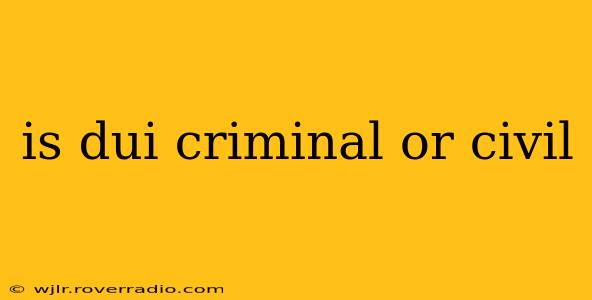Is a DUI Criminal or Civil? Understanding the Dual Nature of Drunk Driving Charges
A DUI (Driving Under the Influence) or DWI (Driving While Intoxicated) charge is primarily criminal, but it can also have significant civil ramifications. This dual nature is crucial to understand because it impacts your legal defenses, potential penalties, and long-term consequences.
Let's break down the criminal and civil aspects:
The Criminal Side of a DUI:
A DUI is a criminal offense because it violates state and, in some cases, federal laws. The severity of the charge varies depending on factors like:
- Blood Alcohol Content (BAC): Higher BAC levels typically lead to more severe charges.
- Prior DUI Convictions: Repeat offenders face harsher penalties.
- Aggravating Circumstances: These could include accidents causing injury or death, driving with minors in the vehicle, or extremely high BAC levels.
Criminal penalties for a DUI can include:
- Jail time: The length of incarceration can range from a few days to several years, depending on the severity of the offense and your history.
- Fines: Significant monetary penalties are common.
- License suspension or revocation: You may lose your driving privileges for a specified period or permanently.
- Probation: This involves adhering to specific conditions set by the court.
- Community service: This requires you to perform unpaid work for the community.
- Ignition interlock device (IID): This device prevents you from starting your car unless you pass a breathalyzer test.
The Civil Ramifications of a DUI:
Beyond the criminal aspects, a DUI can lead to various civil consequences, often stemming from accidents or injuries caused while driving under the influence:
- Civil lawsuits: Victims of DUI-related accidents can sue you for damages, including medical expenses, lost wages, pain and suffering, and property damage. These lawsuits are separate from the criminal case and can result in substantial financial penalties.
- Increased insurance premiums: Even without an accident, a DUI conviction will dramatically increase your car insurance premiums, sometimes making insurance unaffordable.
- Loss of employment: Some employers have strict policies against DUI convictions and may terminate employment.
- Impact on professional licenses: If your profession requires a driver's license (e.g., trucking, taxi driving), a DUI can lead to the suspension or revocation of your license.
What Happens After a DUI Arrest?
The legal process following a DUI arrest is complex and can vary by jurisdiction. Generally, it involves:
- Arrest and Booking: You'll be taken into custody, fingerprinted, photographed, and potentially subjected to a blood or breath test.
- Court Appearances: You'll need to attend court hearings to plead guilty, not guilty, or negotiate a plea bargain.
- Legal Representation: It's highly recommended to hire a qualified DUI attorney to represent your interests throughout the legal process.
How Can I Protect Myself from DUI-Related Consequences?
The best way to avoid the severe consequences of a DUI is to never drink and drive. Designate a driver, use a ride-sharing service, or call a taxi. If you're planning to consume alcohol, make responsible arrangements in advance.
Is a DUI a Felony or a Misdemeanor?
Whether a DUI is charged as a felony or misdemeanor depends on factors like the number of prior DUI convictions and aggravating circumstances. First-time offenders are often charged with misdemeanors, while repeat offenders may face felony charges. The distinction is significant because felonies carry much harsher penalties than misdemeanors.
What are the long-term effects of a DUI conviction?
A DUI conviction can have long-lasting effects, including a criminal record that can impact employment, housing, and travel opportunities. It's important to address the legal and personal consequences promptly to mitigate the long-term effects.
In conclusion, a DUI is a serious matter with both criminal and civil implications. Understanding the potential consequences is critical, and seeking legal advice from a qualified attorney is highly recommended if you've been charged with a DUI. Remember, prevention is key – never drive under the influence.
